An ongoing examination of what it means to “eat local.“ Please read the previous stories here:
Part 1 & Part 2: A profile of local food blogger Scott Koeneman
Part 3: Farmers’ Markets
Part 4: CSAs
If buying direct doesn’t sound appealing but supporting local producers is still a priority, there are other outlets in Champaign-Urbana where one can “buy local.”
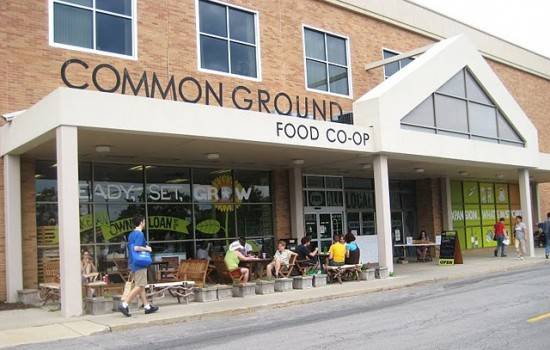
Urbana’s Common Ground Food Co-operative features produce from the Urbana-based Prairie Fruits Farm and Creamery, Tiny Greens and Blue Moon Farm; dairy products from Fairbury’s Kilgus Farmstead; and meat and eggs from the Moore Family Farm in Watseka, Ill., in addition to many other local goods. Common Ground buys from 23 Illinois-based farms in total.
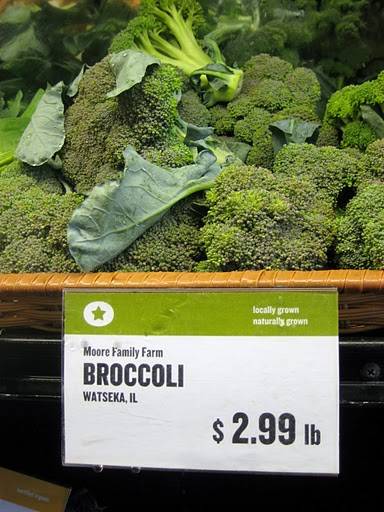
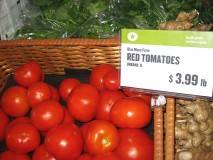
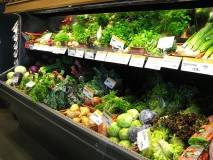
A cooperative is described by the International Co-operative Alliance as “an autonomous association of persons united voluntarily to meet their common economic, social and cultural needs and aspirations through a jointly-owned and democratically controlled enterprise,” Common Ground’s website explains.
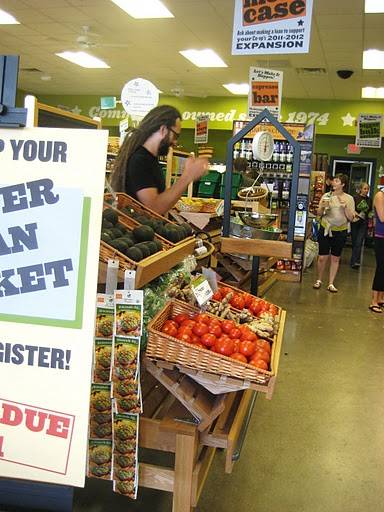 At Common Ground, members pay a small ownership fee – a $60, one-time investment – to “strengthen sustainable and just business practices, local food systems, and invest in building our local economy,” the site states. Owner benefits include discounts on local goods, half-price classes and workshops, discounts on bulk items, patronage dividends, the ability to vote on Co-op-related issues and the opportunity to serve on the Co-op Board.
At Common Ground, members pay a small ownership fee – a $60, one-time investment – to “strengthen sustainable and just business practices, local food systems, and invest in building our local economy,” the site states. Owner benefits include discounts on local goods, half-price classes and workshops, discounts on bulk items, patronage dividends, the ability to vote on Co-op-related issues and the opportunity to serve on the Co-op Board.
Common Ground is open to the public – not just to its owners. Also open to the public is natural foods store Strawberry Fields.
Like Common Ground, Strawberry Fields stocks local goods from Prairie Fruits Farm and Creamery, Blue Moon Farm and Tiny Greens. The store also features local natural meat products, such as beef from Barclay’s Better Beef in Colfax, Ill., and lamb cuts and sausages from Country Cottage Farm in Fisher, Ill.
But Strawberry Fields is not just any old local grocery store; the store’s management provides its shoppers with an on-site nutritionist and with live, local music in its café on weekends. The store also offers a catering service and a wide selection of bulk goods.
C-U residents can look to other local cafés and restaurants for local goods, too. Blue Moon Farm owner Jon Cherniss said that about 10 local restaurants buy from his farm on a weekly basis. Radio Maria, Café Luna, Black Dog, Escobar’s and The Great Impasta are some of his clients.
Bacaro owner Thad Morrow is also a part of Cherniss’s clientele.
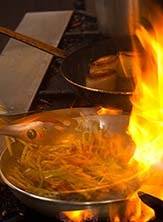 “I really like the human connection,” Morrow said. “I could get this stuff from U.S. Foodservice, but it is so much fun to go talk to Jon at Blue Moon.”
“I really like the human connection,” Morrow said. “I could get this stuff from U.S. Foodservice, but it is so much fun to go talk to Jon at Blue Moon.”
Morrow said buying local food fosters dialogs among him and his customers, cooks and servers.
“[Using local ingredients lets me] connect to people – our guests here – who I would not typically talk to,” Morrow said. “We have this great interaction, and to me that is super exciting.”
Bacaro hosts a Market Dinner every Monday night to feature the produce that Morrow and his team buy at Urbana’s farmers’ market, Market at the Square, each Saturday.
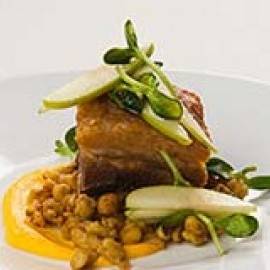 “[One of my employees and I] get our coffee and drive to the farmers’ market, and we brainstorm together about what we could make,” Morrow said. “But [our plan] always changes when we get there…We let what we see direct the menu.”
“[One of my employees and I] get our coffee and drive to the farmers’ market, and we brainstorm together about what we could make,” Morrow said. “But [our plan] always changes when we get there…We let what we see direct the menu.”
Morrow said that Bacaro also receives produce weekly from the Stewards of the Land food co-operative, which is organized by the Spence Farm Foundation in Livingston County, Ill.
“They put stuff together and then I get an e-mail about what they have,” Morrow said. “They don’t even know what some of these things taste like, so they are just as curious to know what we are going to do with something as I am about what it tastes like.”
Morrow noted that he is the only downstate chef who buys from Stewards of the Land, so he “gets to compare notes with the chefs in Chicago” each week.
“It is a small community,” he said. “At that point, we’re all connected.”
 While Morrow recognizes that the trend toward eating locally produced foods is a good thing, he said that he thinks “it shouldn’t be a subject anymore.”
While Morrow recognizes that the trend toward eating locally produced foods is a good thing, he said that he thinks “it shouldn’t be a subject anymore.”
“Every restaurant should be buying local at this stage – it shouldn’t be a question anymore,” he said. “It would be nice if you could go somewhere and buy food, and just know that you are getting local chickens and corn. Chefs shouldn’t have to point it out.”
But until Morrow’s dream comes true, it is up to consumers to educate themselves about how their food is produced.
Next: Knowing our Roots – the faces and practices behind the food we eat








